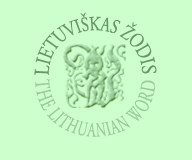-
- PETKEVICAITE, Gabriele (pen mane
Bite; 1861-1943), writer and journalist, born in Puziniskis,
county of Panevezys, on March 18, 1861.
- Having graduated from the Jelgava
(Mitau) girl’s school in Latvija (1878), she assisted her father,
worked in a pharmacy, and taught children as a private tutor. In 1893
she founded the Ziburelis (Light) society to support indigent
students and individuals active in cultural affairs. She was one of
the organizers and chairwoman of the first Congress of Lithuanian
Women in 1907; she also co-founded the Lithuanian Women’s
Association in 1908 and the Women’s Association of Lithuania in
1922. Following the death of her father, she joined the editorial
staff of the newspaper Lietuvos Zinios (Lithunaian News) at
Vilnius in 1909.
- Prompted by P. Visinskis, she began her
career as a writer in 1890 by contributing news items to Varpas
(The Bell). Subsequently, she went on to articles, fiction, drama,
memoirs, literary history, and novel. Her journalistic impulse owes
much to Vincas Kudirka’s complaint in Varpas.
- Her earliest fiction in the form of
short sketches and stories, began to appear in the press in 1894.
Published separately were Tevas ir sunus (Father and Son,
1900); Nebe pirmas (No longer the First, 1902), and Krislai (Motes,
1905). Social and national themes predominate in her writing. Her
ideal was social equality. The harmony that she saw in nature would
also prevail in social life.
- One of her most powerful stories, Dievui
atkisus (Offering it to God) and two-part novel Ad Astra.
- Petkevicaite turned to drama also on the
advice of Visinskis, and together with her protege Zemaite began
writing plays jointly under the pseudonym Dvi moterys (Two
women). These include Velnias spastuose (The Devil in a Trap,
1902), Kaip kas ismano, taip save gano (To each His own Way,
1904); Litvomanai (Fanatics of Lithuanism, 1905); Parduotoji
laime (The Sold Happiness, 1905); Dumblyne (The Bog, 1912).
While these plays are predominantly as expression of Zemaite’s
talent, Kova (The struggle, 1900) is attributed mainly to
Petkevicaite.

